The Everlasting Joy of the Morells of Springfield, MO.
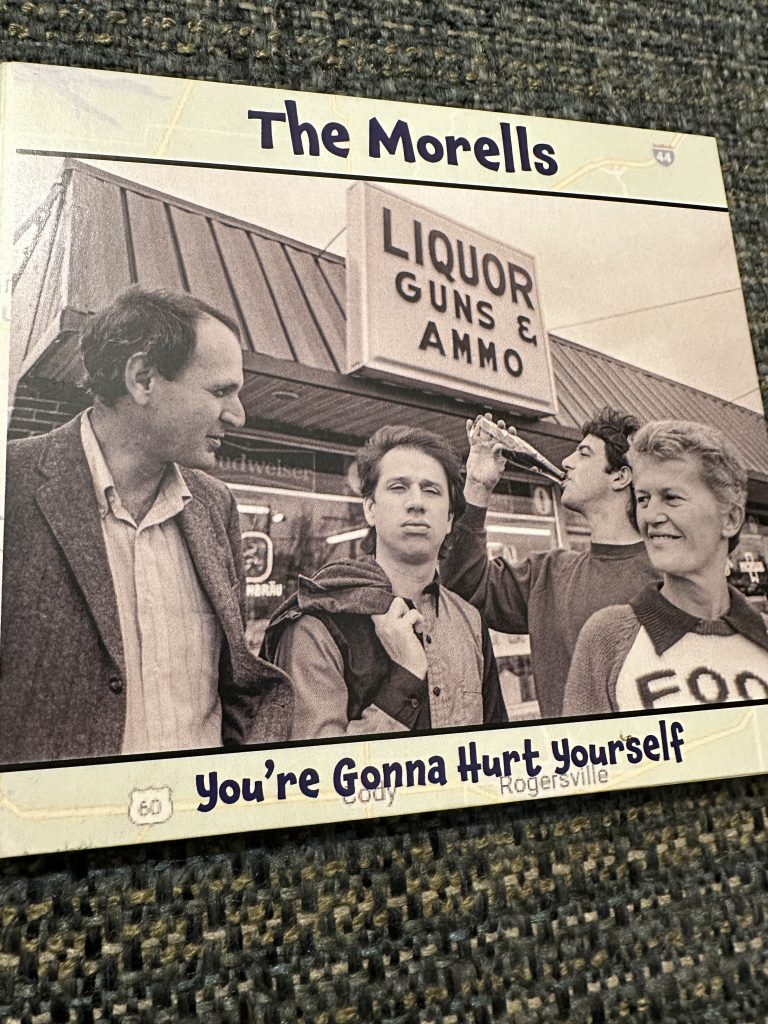
New Morells music! From left, Lou Whitney, D. Clinton Thompson, Ron Gremp and Maralie. Photo taken in Columbia, MO.
Musical archeologist and retired mapmaker Glenn Steinkamp first heard the Morells in 1980. The Morells-Skeletons were one of the great American rock-punk-soul-country bands of that era.
They were based out of Springfield, Mo. They are featured on a beautiful mural in downtown Springfield. They made such an impression on me that we had to make a full-length documentary on them.
The Morells radiated the joy that everyone is searching for today.
In 1982 the Morells released “Shake and Push,” an engaging romp through American rock and America itself—songs about cars, growing beards, hamburger stands on Route 66, and more. “Shake and Push” scored a four-star review from Rolling Stone magazine and notched rave commentary from the New York Times and the Village Voice.
“We did 22 or 23 songs for that Shake and Push album,” Morells-Skeletons guitarist Donnie Thompson said in a mid-September conversation from Springfield. “I never thought about the ones we didn’t use.”
In 2018 Steinkamp was at Thompson’s home helping him put software on his personal computer. Steinkamp noticed a stack of reels in the corner of the room. “Donnie told me that when Lou (Whitney) died and Kay (his wife) sold the (studio) building, they split up all the tapes,” Steinkamp explained. Springfield songwriter, ex-Skeleton and fun guy Nick Sibley got the early Skeletons. The late drummer Bobby Lloyd Hicks got the 1990s Skeletons. And Thompson received tapes made by the Morells and the Symptoms, the 1970s punk-rock predecessor to the Morells.
Steinkamp asked to take the tapes to Whitney’s long-time recording engineer Eric Schuchmann, who continues to operate Whitney’s studio in Springfield, albeit at a different location from where the bands recorded.
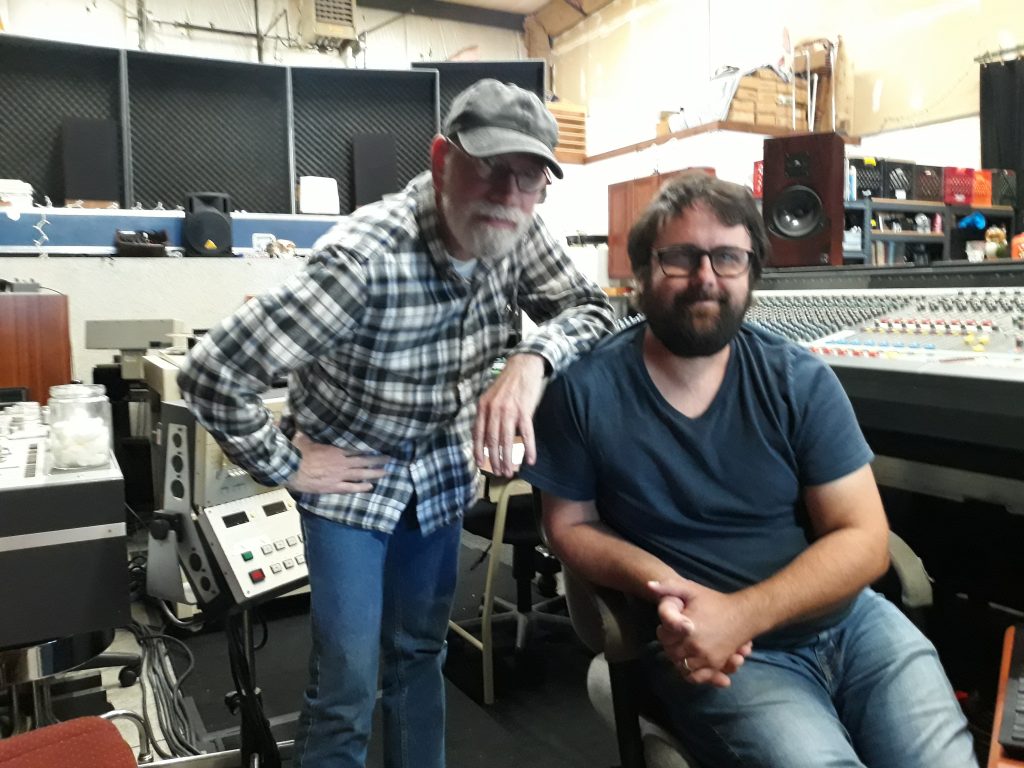
Donnie Thompson (L) and the magical Eric Schuchmann. (Courtesy of Glenn Steinkamp.)
Thompson gave Steinkamp the green light. Schuchmann baked the sticky tapes for 24-48 hours, transferred them to digital, and finally mixed them. It was a labor of love. And joy.
“Wow, what a difference 40 years makes,” Thompson said. “It is way better than I realized. We started our second record and only got six tracks done and we broke up. How I look at it now is that we had another record and didn’t know it. I enjoy listening to it.
“You get far away enough from something and it’s like somebody else did it.”
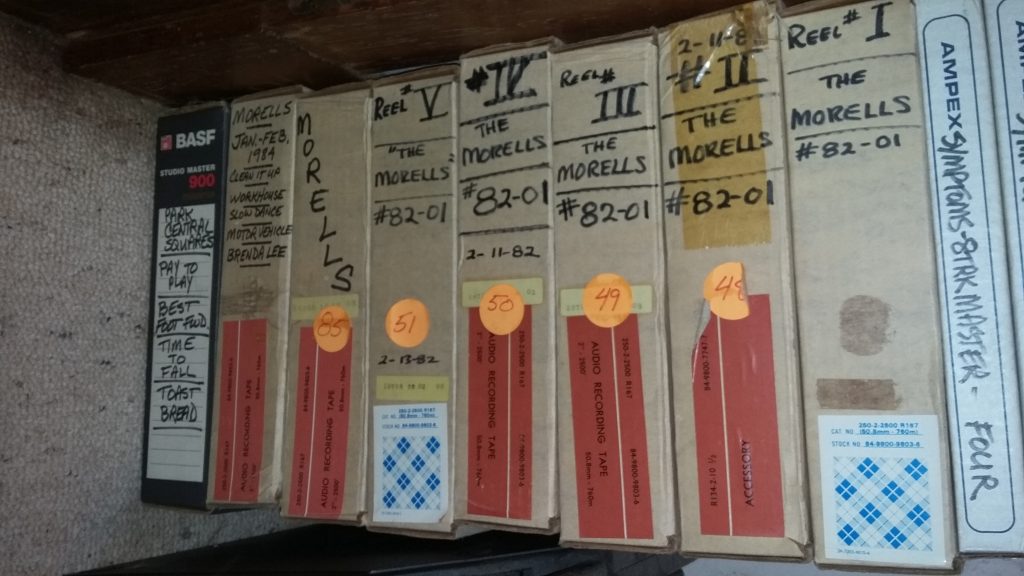
The holy grail. (Thanks Glenn Steinkamp)
The happy result is the 22-track “You’re Gonna Hurt Yourself” Morells CD just released on the Sound Asleep Records label out of the happy country of Sweden. The compilation of all previously unreleased material features popular covers like Roy Head’s “Treat Her Right,” Lee Hazlewood’s “Surfin’ Hootenanny” and three precious Ben Vaughn songs including the ballad “I’m Sorry (But So is Brenda Lee)” with the super fun Joe Terry on keyboards. Lou Whitney’s social justice rockabilly number “Thirty Days in the Workhouse” (updated from the Leadbelly ballad) appears too.
Six Thompson bonus tracks include an empathetic take of Santo and Johnny’s “Sleep Walk,” the Morells classic gang vocals (Maralie, Lou, Joe Terry, Lloyd, Springfield songwriter- publisher Guy Workman and Thompson on lead) on the 1963 Barry Mann- Cynthia Weil pop tune “Talk To Me Baby” and Benny Spellman’s 1965 soul chestnut “I Feel Good,” which would be a perfect call for Chicago’s Flat Five.
Somewhere Beatle Bob is dancing.
Here is how to order “You’re Gonna Hurt Yourself.” It’s only $15. Allow one to two weeks for delivery.
Here is how to learn more about “The Center of Nowhere” documentary on Lou and the meaning of Springfield. Steinkamp also assisted with the documentary music. The doc is streaming Vimeo, The Docudrama channel on Amazon Prime and other platforms. DVDs with extras are also available.
Steinkamp was living in Kansas City, MO. in 1980. He had just begun working at the Defense Mapping Agency (DMA) after attending Southwest Missouri State University. Someone told him about the Morells (Lou Whitney, his wife Maralie, Thompson, drummer Ron Gremp, and Jim Martin on saxophone.) Steinkamp went to their gig in a lounge bar at a Holiday Inn in North Kansas City. The band loved lounge bars.
“I’d grown up with ‘70s hard rock like Slade, Deep Purple, and Led Zep,” Steinkamp wrote in an early September e-mail. “And I got into country rock and fusion jazz in college. But I had never been exposed to ‘oldies.’ I had never heard a tight rock band combo play two-to three-minute-long rock n’ roll songs from the 1950s and 60s. I’m sure the songs were covers but to me and many our age they were brand new.
“I was supposed to leave for the Buffalo River in Northwest Arkansas the next day for a camping trip, but I bailed to see them play the next two nights.”
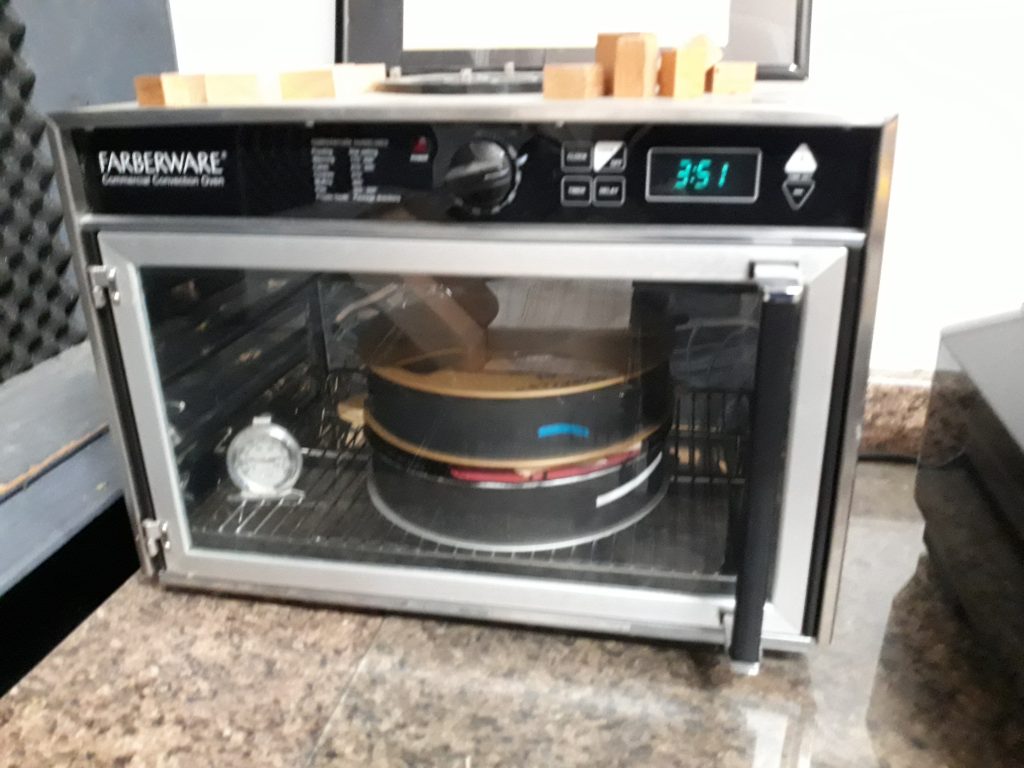
Sonic chef Eric Schuchmann baking lost Morells tapes. (Courtesy of Glenn Steinkamp)
It took Steinkamp about five years to get it together to launch the reissue project in October 2022. “ Donnie was also glad that these transfers allowed him and Eric (engineer) to remix the original ‘Shake and Push’ album too,” Steinkamp wrote. “He always thought it was a bit too bright and lacked deep bass. Eric was the key to all this with his talent, skill, and enthusiasm. I’m grateful for everything he did.”
Jerker Emanuelson founded his Sound Asleep label in 1994. He began rolling out a series of power pop-country chestnuts in his “Hit the Hay” series that now covers 13 volumes and 385 songs. “When I started my label I got in touch with (Skeletons drummer) Bobby Lloyd Hicks to ask if they would like to have a song on a compilation,” Emanuelson wrote in an e-mail from Sweden. “In 1999 they gave me the exclusive song ‘Morse Code’ (Don Woody’s 1956 rockabilly toe-tapper) for ‘Hit the Hay, Vol. 3.’ I also got in touch with Lou (Whitney) and stayed in touch with both of them until they sadly passed away. Whitney died in 2014 at the age of 71. Hicks died in 2017 at the age of 69.
Emanuelson became a fan of the Morells-that-morphed-into the Skeletons in 1980 when he bought a copy of the Skeletons ‘45 “Trans Am” (Whitney’s best car song) backed with “Tell Her I’m Gone.” He wrote, “After that I’ve been collecting pretty much everything they released. I saw the Skeletons in Austin (TX.) a few times in 1991 and in Sweden in 1992.”
“You’re Gonna Hurt Yourself” also shines light on Ben Vaughn, the band’s spiritual compatriot. Besides the Brenda Lee track the project includes Vaughn’s “M-M-Motor Vehicle” and the pure pop title track with Thompson on empathetic lead vocals. Steinkamp said, “When they met Ben it was like they had found their own personal songwriter, like Madame Fortuna had blessed the band. When they started playing Ben’s songs, they went to a new level, it wasn’t just obscure oldies covers anymore. It was wild, crazy, fun unique songs from Ben.” The Skeletons also covered Vaughn’s “I Dig Your Wig” and “The Man Who Has Everything,” from 1982’s “Shake and Push.” Vaughn considers that pop tune his songwriter breakthrough.
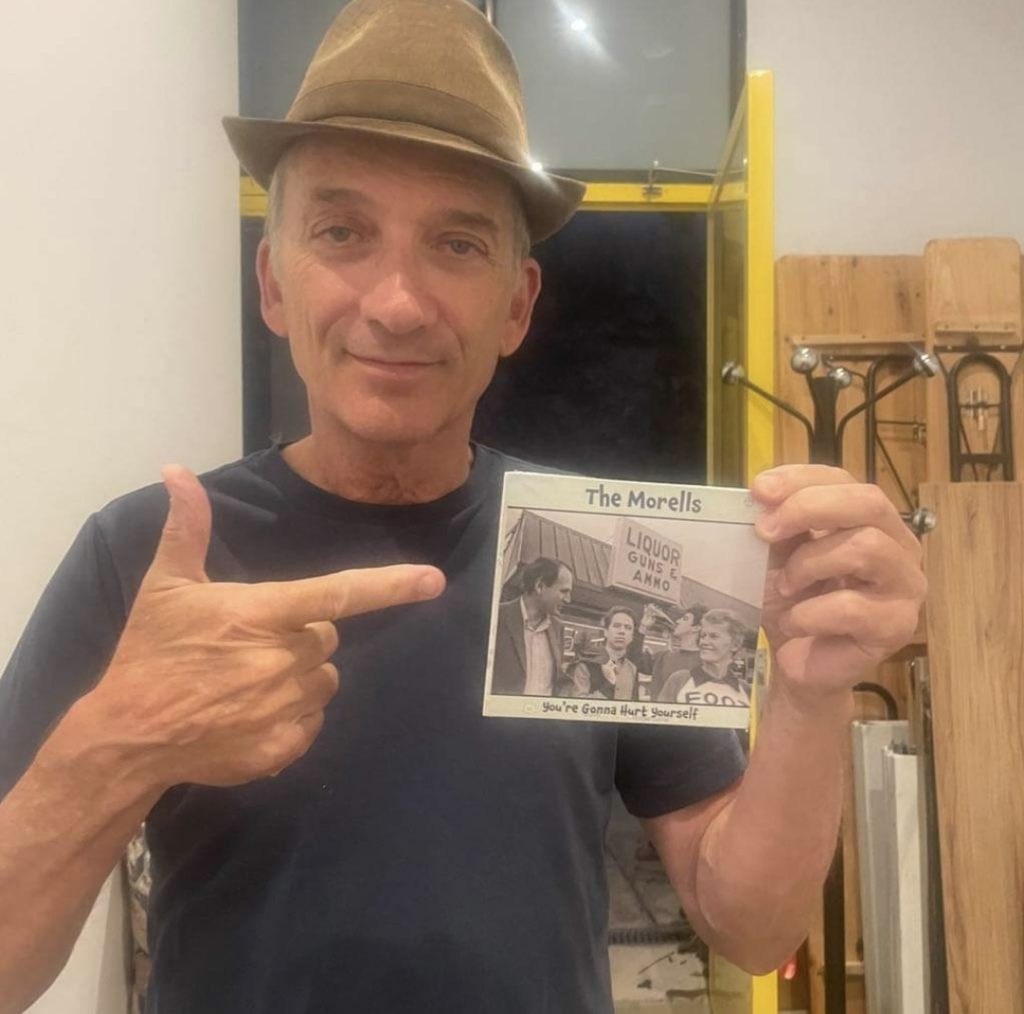
Ben Vaughn digs the Morells.
Thompson added, “At the time Ben and I had about the same vocal range—which is not big. The first time we went to New York we played the old Peppermint Lounge. Ben came to the gig. He was living in New Jersey. He gave me a demo cassette. I took it home and it was, ‘This stuff is really good.’ And I could sing it. We’ve been connected ever since.”
Steinkamp researched the song publishing for “You’re Gonna Hurt Yourself” and Emanuelson paid songwriters through Sweden’s system.
Thompson’s take on Santo and Johnny’s 1959 instrumental hit “Sleep Walk” is detailed and profound. “I was born in 1951 and Sleep Walk’ was on the radio,” he said. Thompson’s family moved to Springfield from Kansas City, MO. in 1961. “When I was little in Kansas City, me and my brother had to share a bedroom and we went to sleep with the radio on. Then I got older, got my own room and found WLS (in Chicago). Art Roberts, I used to listen to Dick Biondi at night. During the British Invasion, he had the top three requested songs every night. I’d get mad, ‘What, you can’t knock the Kinks off of that!’ I used to be really militant about music. I’ve relaxed some since.”
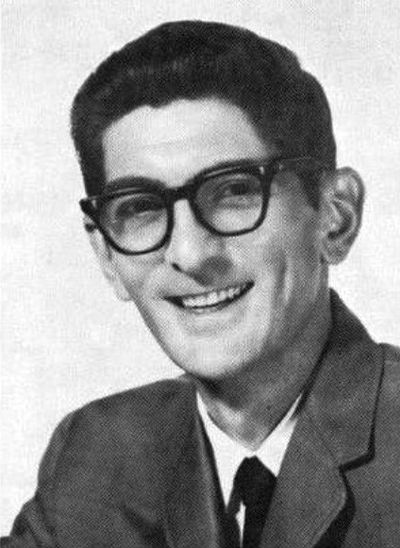
Chicago DJ Dick Biondi upset a young Donnie Thompson.
The bonus tracks are from a series of ‘45s from Thompson that have never made it on CD. “The Morells had broken up and it was my idea to do those songs anyway,” he explained. “What those were was Lou trying to learn to engineer. It was kind of an exercise for him. He did a great job.”
Extra highlights on the CD include a fun acapella cover of Jimmy Van Heusen’s 1940 chestnut “Imagination” ( tackled by Bob Dylan on his 2017 “Triplicate” album). And on the upcoming “Donnie’s Mood” be on the lookout for a jazz-lounge take of the Kinks’ hit “You Really Got Me.” Thompson said, “I saw an interview with Ray Davies where he said ‘You Really Got Me’ was originally written as a jazz number. I thought he was joking but I thought about it and yes, it could be a jazz number.”
This fall Thompson will release 12 more mostly instrumental tracks in vinyl-CD format called “Donnie’s Mood” on the reborn Borrowed label, financed by Kansas City, Mo. restauranteur Phil Bourne who assisted with the ‘Shake and Push’ record. You can currently hear the tracks on YouTube. Thompson deploys a Tele, Strat, and Epiphone Casino on the tracks. “I have some more stuff if this thing does something,” he said.
In the early 1980s the Morells were riding high on the critical acclaim of “Shake and Push.” The band was getting airplay on WNEW in New York City. Stephen Leeds, the Vice-President of A&R for the East Coast division of MCA invited Whitney to the palatial MCA office on 52nd Street. Years ago Whitney told me, “I get on the elevator and get up to the MCA floor. The door opens and there’s all these gold records going down this big hallway. And they’re playing ‘Hamburger, cheeseburger, lettuce and tomato’ (from the Whitney-Thompson anthem “Reds,” which was the heartland cousin to the 1978 MCA release of Jimmy Buffett’s “Cheeseburger in Paradise.”)
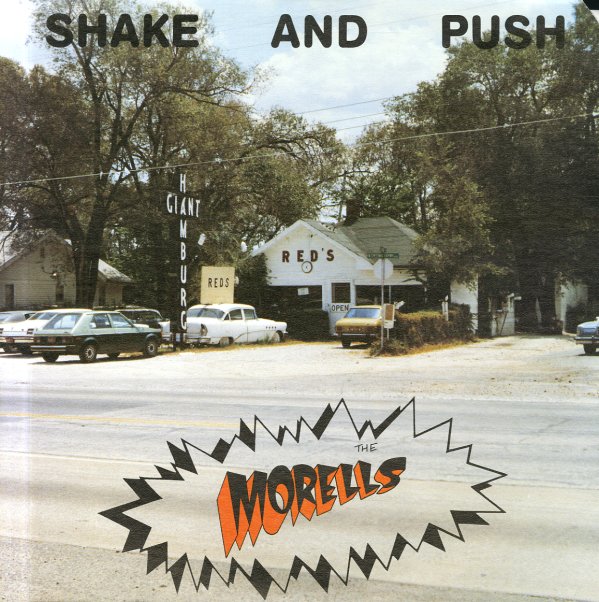
The project that caught the attention of MCA Records. That’s the iconic Red’s hamburger stand on Route 66 in Springfield. (Since razed.)
Whitney walked into Leeds’ office and was put on speakerphone with MCA representatives in Los Angeles. The Morells were poised to be the biggest thing out of Springfield since the Bass Pro Shop. “We were just looking for a record company to put it out, give us enough money to gear up and tour,” Whitney said. “He said we had a deal. I walked out of there with two feet off the ground.”
The Morells vibe returned to Springfield higher than a Mexican cartel down I-44. In a follow-up call, Leeds asked the band what they needed. The Morells had a meeting. “We came up with a number like $9,752,26,” Whitney said with a laugh. “To get cases for our stuff. To rent a Ryder truck. He said, ‘No problem, I’ll call you Monday to iron this out.”
Dead silence. “I had talked to him on a Wednesday,” Whitney recalled. “Monday came. Nothing happened. Tuesday came. No call. Wednesday came, so I got the MCA number I had and the secretary said, ‘Mr. Leeds is no longer with the company.’ He had gotten canned on Friday.”
The deal was off. Mired in frustration, the Morells broke up. Whitney delved deeper into production and Thompson began playing guitar with the Ozark Mountain Daredevils.
That’s just another reason “You’re Gonna Hurt Yourself” is essential listening.
It is the rest of the story.
And the best part of this chapter is how this American music holds up through steadfast honesty, keen musicianship, and a sense of eternal joy. The time is today for the Morells.









Hello Dave,
Been a Morells fan since I heard “Reds” on ‘XRT in 1981 or 2. Saw them at their first major Chicago show at Tuts when it was on Belmont. I’ve loved them since. All permutations of the band. Saw the Skeletons many times in street fairs, backing national touring acts and in clubs. Then back to the Morells until Lou Whitney passed away.
Also wanted to say I loved your writing in the Chicago newspaper too.
Take Care,
Cary
Thank you for reading and writing, Cary! Our doc is still out there! A perfect stocking stuffer! Dave